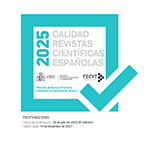The Cathode-ray Doctrine. Religion and Nationalist Spirit Subjects in Francoist Television (1958-1975)
Abstract
Between 1945 and 1970, the educative laws of Francoism highlighted as special importance subjects Religion and Formación del Espíritu Nacional -Nationalist Spirit Formation-, which were present in all levels of education. The importance inside the schools was complemented with a support in publics audiovisual media, with the broadcasting of contents that supported the syllabus of both subjects. This research gathers all registers of the broadcasts in TVE’s First Channel between 1958 and 1975 and analyses them. The authors conclude that, even while both types of content had a great presence in the screens, religion had the pre-eminence, both in minutes broadcasted and in the time bands chosen. Moreover, religion was important in television until Franco’s death, while the contents linked to Falange’s ideology tended to disappear or to be transformed in entertainment programmes that, albeit still had political charge, were subtler. In addition, there is an effort by TVE to programme the contents in a time band according to their target public, although more often than not these strategies were based on stereotypes more than in any real knowledge of the audience’s interests.
Downloads
Article download
License
In order to support the global exchange of knowledge, the journal Estudios sobre el Mensaje Periodístico is allowing unrestricted access to its content as from its publication in this electronic edition, and as such it is an open-access journal. The originals published in this journal are the property of the Complutense University of Madrid and any reproduction thereof in full or in part must cite the source. All content is distributed under a Creative Commons Attribution 4.0 use and distribution licence (CC BY 4.0). This circumstance must be expressly stated in these terms where necessary. You can view the summary and the complete legal text of the licence.










